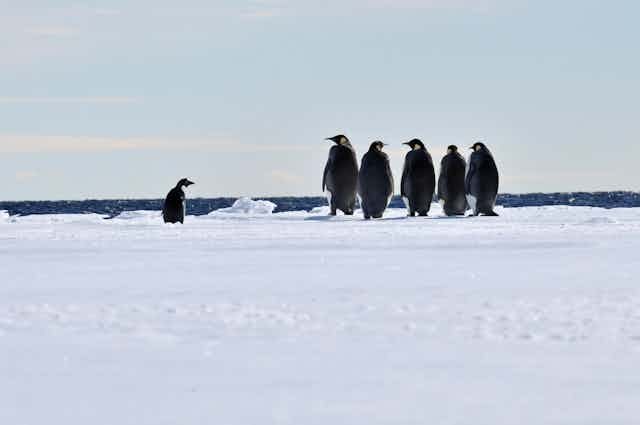Russia blocked the approval of new marine protected areas in the Antarctic this week, demanding more scientific information and a definition of marine protected areas.
The surprise move postpones a joint proposal by Australia for a system of marine reserves in east Antarctica. So, why do we need more protected areas in the Antarctic?
When too much science is never enough?
The Commission for the Conservation of Antarctic Marine Living Resources, an international body of which Australia is a member, has been looking to create a system of marine protected areas in the Antarctic for a decade.
In 2005 the Commission agreed to establish marine protected areas in Antarctica and in 2009 set a goal to achieve a comprehensive system by 2012. While that target passed, the Commission has discussed various reserve proposals. It even agreed to create two large areas at South Georgia and the South Orkney Islands.
Last year the Commission failed to reach consensus on two large-scale protected area proposals. This week’s Special Meeting in Bremerhaven, Germany, was meant to break the deadlock.
The two proposals are: a comprehensive system of protected areas in east Antarctica sponsored by Australia, France and the European Community; and a proposal from New Zealand and the United States for a marine reserve in the Ross Sea.
Media reports in the lead up to the meeting suggested that the only parties yet to be convinced to support the proposals were Russia and the Ukraine. Both are heavily engaged in fishing toothfish in the Antarctic.
But there was genuine surprise at what Russia did at the meeting. From out of the blue Russia challenged the Commission’s legal capacity to make marine protected areas, and went on to insist that the Commission find a legal definition of what a marine protected area is. After months of international diplomacy and scientific discussion this filibuster came as a surprise even to scientists on Russia’s own delegation.
Access to fishing grounds might motivate some Commission members to oppose marine reserves. But in the often ritualised and opaque language of Commission meetings another less transparent argument is sometimes used: “lack of scientific justification”.
Despite the Scientific Committee endorsing the East Antarctic proposal in 2011 as “containing the best scientific evidence available” argument in the intervening meetings has often come down to “we need to see more science”.
Why more marine protected areas?
The entire area governed by the Commission already has a high level of protection because of its Convention. It also overlaps entirely the Antarctic Treaty area which covers everything below 60 degrees South.
But establishing a representative system of marine protected areas in the Antarctic will add to this protection and provide global scientific and conservation benefit.
Scientific reference areas allow for the study of the cumulative impacts of human activity in Antarctica. A well-established marine reserve system will provide a powerful scientific tool to help separate changes in the Antarctic environment that are caused directly by human activity from those caused indirectly; for example, by climate change.
And some of the marine reserves themselves will provide direct benefit as refuge areas for commercially harvested species, or for other species and ecological communities that require direct protection.
What is to be done?
There is little doubt that Russia’s supposed concern about the Commission’s legal capacity to declare marine protected areas is wrong. The provisions are in the Convention.
They are also in the practice of the Commission, which has declared marine protected areas in the Antarctic – decisions that Russia participated in, and agreed to by consensus.
Russia’s tactic should be called for what it is: a transparent blocking manoeuvre by one country in a consensus organisation. Russia has used this tactic in the past to stop some of its ships being entered on the Commission’s list of “Illegal, Unregulated and Unreported” fishing vessels.
If a new standard of scientific evidence is to be applied to the establishment of marine protected areas in the Antarctic, the same standard should be applied to all fisheries proposals in the region.
Strong resolve should be maintained to keep the Commission’s world-recognised tradition of being both precautionary and innovative. The science behind the marine protected area proposals is robust and should not be watered down by fabricated concern over the amount of science required for them to be justified.
The MPA proposals should be defended by both fishing and non-fishing Members of the Commission: the marine reserves do not reduce the allowable catch available to fishing countries. And it is both wrong, and a narrow view of science, to assume that the only way to get appropriate data is to be able to fish everywhere. An unfettered right to fish is not the purpose of the marine life convention – conservation of Antarctic marine living resources is.
The next regular meeting of the Commission will be held in Hobart in October. It now remains to be seen whether any progress can be made there.

